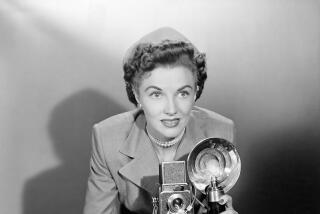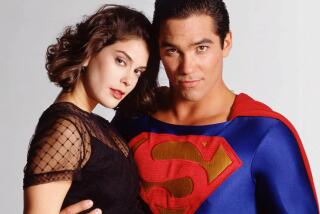‘Smallville’: Tom Welling on saying goodbye to Superman
Tom Welling has a new office on the Warner Bros. lot and there’s an empty parking spot right out front -- it’s marked “C. SHEEN” -- which reminds him how quickly things can change in television and how lucky he’s been to be one of television’s steadiest stars, with a decade logged on the now-ending “Smallville.”
“It can all go away and can go fast,” said the 34-year-old, whose new digs still had unpacked boxes and bare walls when he sat down last week to talk about the final flight of “Smallville,” which airs the two-hour series finale (appropriately titled “Finale”) on May 13 on The CW. “I feel so grateful. But I also know it’s time to move on.”
Welling leaves the show with mixed feelings, and that’s entirely appropriate for a man who spent 10 seasons as a Clark Kent who was perpetually denied the chance to be Superman -- the show, for the uninitiated, follows the odyssey of Superman’s alter ego in his formative years and the title is the name of the little rural town where the future superhero grew up with his human adoptive family.
The New York native didn’t want the role -- his headshot was plucked out of a stack by producer Alfred Gough, who asked why the handsome, towering actor wasn’t among the hundreds of hopefuls who sought an audition in “a massive manhunt” to find the star in 2000.
The simple reason was that red-and-blue costume, the same one that brought success to actors such as Christopher Reeve and George Reeves in previous decades but came with a smothering career cost -- after they flew across the sky in the public imagination they were locked into the image. When Welling found out the new show had the motto of “no tights, no flights,” he was far more intrigued.
“He brought an openness and warmth to the role,” Gough said. “He’s also incredibly good-looking and somehow is more good-looking in person, if that’s possible.”
During the fourth season of the show, Welling had learned so much on the set that he got a new ambition -- directing. He did just that in the fifth season and another one of his efforts was the Booster Gold episode that aired with great fanfare recently. Even before Welling was directing, he was “a leader” on the set, Gough said, and certainly he was qualified -- no other cast member appears in every episode and only two crew members have stayed on for the entire run.
Welling isn’t certain about his next move. There was a fan movement to get him the lead role in the new Superman film that will begin shooting next year with Henry Cavill in the tights (and there was a similar campaign for the 2006 movie “Superman Returns” that took flight with Brandon Routh), but “Smallville” has created such a wide, deep thicket of its own mythology that it seemed unlikely that a reboot of the hero would take him on if it were seeking a true fresh start.
Welling seems OK with that. The conventional view that a film franchise is better than TV in every way misses the emotional factor of persistence, he said; he came into the homes of fans again and again for a decade, and that’s a potent relationship. “Besides,” he said, “I’m busy.”
Last year, Welling pushed in a new direction as the executive producer of “Hellcats,” the CW series that is a comedy-drama adaptation of the book “Cheer: Inside the Secret World of College Cheerleaders.” The show is slick and frothy at the same time, and Welling is pleased with the show and the ensemble cast -- he says that after holding up a show, it’s engaging to be part of “a team with a great spirit.”
“Smallville” had plenty of bumps in its flight since its first episode in October 2001. The show went from The WB to The CW in 2006 and the tone of the show changed through the years, with some of the visiting superheroes bringing a campy aura at times. The show enjoyed a surge in credibility and ratings in recent years, but it was running out of room -- how long could Kent go into manhood without donning the suit?
“Each time we got picked up we had to push that finish line further away, and I think we had some low moments when we got too far-fetched,” he said. “If you look at the series, the first five years were one show and the next five were a different show.
“We could have called it ‘Metropolis,’ in a way ... there were a few times when heroes come in where we allowed ourselves to get lighter. But that’s breaking things up. I don’t think anyone goes out and tries to make mistakes.”
More to Read
The biggest entertainment stories
Get our big stories about Hollywood, film, television, music, arts, culture and more right in your inbox as soon as they publish.
You may occasionally receive promotional content from the Los Angeles Times.










